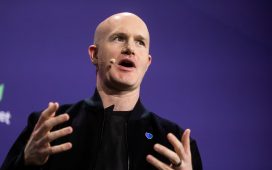Healthcare Realty Trust building in in Nashville, Tennessee.
Source: Google Maps
Company: Healthcare Realty Trust (HR)
Business: Healthcare Realty Trust is a self-managed and self-administered real estate investment trust that owns and operates medical outpatient buildings primarily located around hospital campuses. The company selectively grows its portfolio through property acquisition and development. Its portfolio includes nearly 700 properties totaling over 40 million square feet, concentrated in 15 growth markets. The company’s properties are in high-growth markets with a broad tenant mix that includes over 30 physician specialties.
Stock Market Value: $6.38B ($17.99 per share)
Healthcare Realty Trust’s shares in 2024
Activist: Starboard Value
Ownership: 5.90%
Average Cost: $17.14
Activist Commentary: Starboard is a very successful activist investor and has extensive experience helping companies focus on operational efficiency and margin improvement. Starboard has taken a total of 155 activist campaigns in its history and has an average return of 23.37% versus 14.29% for the Russell 2000 over the same period.
What’s happening
On Nov. 26, Starboard filed a 13D with the U.S. Securities and Exchange Commission, disclosing a 5.90% position in Healthcare Realty Trust.
Behind the scenes
Healthcare Realty Trust (HR) is a real estate investment trust that owns and operates medical outpatient buildings located primarily on or around hospital campuses. On Feb. 28, 2022, the company entered into an agreement to merge with Healthcare Trust of America (HTA) in an approximately $18 billion deal. Despite HR shareholder strong approval with 92% of the votes cast, the merger was somewhat dilutive to HR shareholders as the deal implied a sub-5% cap rate, whereas HR traded above that at the time.
But management had the opportunity to show the wisdom in the acquisition by integrating the two businesses, recognizing synergies and cutting costs and bringing down the cap rate to below the 4.85% blended cap rate implied in the merger. That did not happen. Just over two years later, property operating expenses have risen from 31% to 37%, several percentage points above peers. Further, funds from operations (“FFO”) yield is 9%, far higher than its peers in the 5% to 6% range. Finally, the cap rate is at 7%, and the stock is down over 15%, versus an increase of 33% for the Russell 2000. About three weeks ago, the company’s long-time CEO Todd Meredith, who served as president and CEO for eight years and spent a total of 23 years with Healthcare Realty, stepped down.
Help is on the way, in the form of Starboard Value (although, I am not sure if that is how the company views it). Nevertheless, Healthcare Realty is now at a critical inflection point, and there are two paths to unlocking value here. The first is to remain a standalone company, which would require the hiring of a new CEO, the most important function of a corporate board. However, after entering into a questionable acquisition and overseeing an underperforming management team, stockholders would be well within their rights to question whether this is the right board to embark on this crucial search. So, going down this path in a way that creates value for shareholders would mean a refreshment of the board. We would expect that Starboard would want at least one of those seats to assist in this decision. From there, the company is in great need of an operational turnaround to address its bloated cost structure to bring Healthcare Realty more in line with peers, something else that Starboard has shown to have an expertise in from a board level. This would be a long and uncertain path, but definitely doable with the right board and management team.
That brings us to the second, shorter and more certain path: a sale of Healthcare Realty. If there are two things that put a company in pseudo-play, it is the arrival of an activist and the departure of a CEO. This company has both of those. There are several potential strategic acquirers for this company – specifically larger companies whose cost of capital and cap rates are lower, such as Welltower, Healthpeak and Ventas, whose cap rates are approximately 5% to 5.5%. This is not just an academic hypothesis. Interest from strategic buyers has already been demonstrated: About a month after Healthcare Realty and Healthcare Trust of America agreed to merge, Welltower offered to acquire Healthcare Realty for $31.75 a share in a nearly $5 billion all-cash bid (the company ended Friday’s session at $17.99 per share). It is interesting to note that when the Healthcare Trust of America merger was approved, activist fund Land and Buildings unsuccessfully opposed the transaction in favor of the Welltower offer.
Boards and management teams generally cower at the thought of an activist. But this board should welcome Starboard and not only because of its reputation as a constructive activist who works well with management to create value, but because Healthcare Realty is at an inflection point where the board needs to decide whether it is going to do a full search for a new long-term CEO or explore a sale. In either case, it is helpful to have a shareholder representative like Starboard involved. Starboard is a top operational and corporate governance activist. If the first path – a search for a new CEO – is the right path for shareholders, there is nobody better to work with the board in implementing that plan. While the firm is the furthest thing from a “sell the company” activist, it’s a fiduciary and an economic animal that will do whatever is in the best interest of shareholders. Further, if there is an opportunity to sell the company, they would weigh that against a plan to find a new CEO. This is very similar to what the firm did in one of its prior activist campaigns. In 2018, a similar dual-path situation unfolded at Forest City Realty Trust. Initially, Starboard went down the path of long-term value creation – refreshing the board and focusing on improving the company’s cost structure. However, during this process, Brookfield Asset Management came into the picture with an offer to acquire Forest City Realty at $25.35 per share – a huge premium. This was an offer Starboard simply could not refuse, and the firm exited this situation up 47.27% compared to a 7.2% loss for the Russell 2000 over the same period.
While we believe management should welcome Starboard at this crucial juncture, we have been surprised by management teams before. Starboard has not yet officially nominated directors, and the firm has until Dec. 10 to do so. That is not a long time to agree on a settlement, and we could see Starboard nominating a slate if only to preserve their options going forward.
Ken Squire is the founder and president of 13D Monitor, an institutional research service on shareholder activism, and the founder and portfolio manager of the 13D Activist Fund, a mutual fund that invests in a portfolio of activist 13D investments. Healthcare Realty Trust is owned in the fund.











